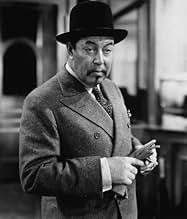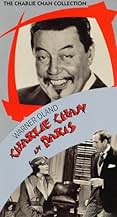IMDb RATING
7.1/10
1.8K
YOUR RATING
Hired to investigate forged bonds, Charlie is thwarted by the murder of his undercover agent, but the arrival of son Lee helps him uncover the true culprits.Hired to investigate forged bonds, Charlie is thwarted by the murder of his undercover agent, but the arrival of son Lee helps him uncover the true culprits.Hired to investigate forged bonds, Charlie is thwarted by the murder of his undercover agent, but the arrival of son Lee helps him uncover the true culprits.
Perry Ivins
- Bedell
- (as Perry Ivans)
Lynn Bari
- Club Patron
- (uncredited)
Tex Brodus
- Bank Worker
- (uncredited)
James Carlisle
- Club Patron
- (uncredited)
Harry Cording
- Gendarme Arresting Yvette
- (uncredited)
Gino Corrado
- Pierre
- (uncredited)
Storyline
Did you know
- TriviaThis film was thought to have been lost for many years until a print was discovered in Czechoslovakia in the 1970s. After a number of showings in various revival cinemas throughout the USA, it was first telecast in the New York City area Saturday 12 August 1978 on WNET (Channel 13);
- GoofsWhen the camera shows a POV shot of the beggar on the roof try to hit Charlie with a large stone block, Charlie is seen drawing out his pistol. In the next sidewalk shot of Charlie, he has not yet put his hand into his pocket.
- Quotes
Charlie Chan: Perfect case, like perfect doughnut, has hole.
Inspector Renard: Ha, I see. Same old pessimist, aren't you?
Charlie Chan: Optimist only sees doughnut. Pessimist sees hole.
- ConnectionsFollowed by Charlie Chan in Egypt (1935)
Featured review
"Charlie Chan in Paris" (Fox, 1935), directed by Lewis Seiler, the seventh installment to the long running and extremely popular 'Charlie Chan' mysteries starring Warner Oland, is an immediate sequel to "Charlie Chan in London" (1934), in which the story opens with the Oriental sleuth arriving in Paris following his latest case in London. What makes this particular episode special, other than the near perfect Paris backdrop sets and interesting suspense buildup near the conclusion, is the introduction of Keye Luke playing Charlie Chan's Number One Son, Lee. The chemistry between Oland and Luke worked out so well that Luke became a regular, thus, setting the pattern to the future installments that has made the series based on Earl Derr Bigger's created character so successful.
Following the montage of stock footage of Paris, the story immediately gets underway as Charlie Chan (Warner Oland), getting off the airplane where he is set to visit his friend, Victor DeCartier (Thomas Beck). While at the airport, Charlie comes across a crippled beggar, and after boarding a taxi, a rock crashing through the window that nearly misses him is picked up by Charlie with a note attached reading, "The purpose of your visit is known. If you place the least value of your life, leave France tonight. This is your only warning." Of course Charlie is not easily frightened. Having met other characters, including Max Corday (Erik Rhodes), Yvette Lamartine (Mary Brian) and Renee Jacquard (Ruth Peterson), Charlie is entertained at a café where he witnesses the Apache dance, where Naldi (Dorothy Appleby), a woman working as a dancer, actually an undercover agent, is murdered. While attempting to keep his appointment at Le Singe Bleu, Charlie encounters the mysterious beggar again. The beggar becomes the key element to the mystery, leading to more murders. Aside from his involvement with Yvette, accused of murdering her blackmailer, Albert DeFresno (John Miljan), Charlie encounters an intruder in his hotel room only to find him to be his son, Lee (Keye Luke), taking time away from college to visit and afterwards assist his father in solving his latest caper.
Featured in the supporting cast are: Minor Watson as Mr. Renaud; Henry Kolker as Monsieur LaMartine; John Qualen as Concierge; Murray Kinnell as Henri LaTouche; and Perry Ivins as Bedell. For his introduction to the series, Keye Luke's Lee addresses his father as "Dad," although he does call him "Pop" on a couple of occasions, though "Pop" would be the standard name for his father. As the series progressed, the Lee character changed from a serious-minded son to comic relief.
Close to being virtually forgotten today, "Charlie Chan in Paris" is best known as being a lost entry in the series with a print to actually be discovered in the 1970s, while earlier episodes, "Charlie Chan Carries On" (1931), "Charlie Chan's Chance" (1932), "Charlie Chan's Greatest Case" (1933) and "Charlie Chan's Courage" (1934), all featuring Oland, continue to be among the missing links. Thanks to its discovery, "Charlie Chan in Paris" has become a welcome addition to the television markets, and at long last, introduced to television, in the New York City area anyway, on August 12, 1978, becoming the final installment to the eight-week television series, titled "Lost and Found" (1978) hosted by Richard Schickel on WNET, Channel 13. "Charlie Chan in Paris" was also the only sound movie to the list of formerly lost silent movie titles presented. For the "Chan" segment, Schickel did go on to mention in his discussion about Keye Luke's performance as Chan's son to be actually a one-time commitment resulting becoming an addition to the series. In later years, "Charlie Chan in Paris" became one of several Chan titles to be distributed on video cassette, as well as being presented on American Movie Classics from 1989 to 1990, and seven years later, was resurrected on AMC from 1997 to 1998. With Warner Oland as one of the more notable Charlie Chan portrayals, his venture in Paris ranks one of the better entries and worthy screen entertainment for any mystery lover or follower to the 'Charlie Chan' mysteries. Next installment: "Charlie Chan in Egypt" (1935), with Warner Oland, but without Keye Luke. (**1/2)
Following the montage of stock footage of Paris, the story immediately gets underway as Charlie Chan (Warner Oland), getting off the airplane where he is set to visit his friend, Victor DeCartier (Thomas Beck). While at the airport, Charlie comes across a crippled beggar, and after boarding a taxi, a rock crashing through the window that nearly misses him is picked up by Charlie with a note attached reading, "The purpose of your visit is known. If you place the least value of your life, leave France tonight. This is your only warning." Of course Charlie is not easily frightened. Having met other characters, including Max Corday (Erik Rhodes), Yvette Lamartine (Mary Brian) and Renee Jacquard (Ruth Peterson), Charlie is entertained at a café where he witnesses the Apache dance, where Naldi (Dorothy Appleby), a woman working as a dancer, actually an undercover agent, is murdered. While attempting to keep his appointment at Le Singe Bleu, Charlie encounters the mysterious beggar again. The beggar becomes the key element to the mystery, leading to more murders. Aside from his involvement with Yvette, accused of murdering her blackmailer, Albert DeFresno (John Miljan), Charlie encounters an intruder in his hotel room only to find him to be his son, Lee (Keye Luke), taking time away from college to visit and afterwards assist his father in solving his latest caper.
Featured in the supporting cast are: Minor Watson as Mr. Renaud; Henry Kolker as Monsieur LaMartine; John Qualen as Concierge; Murray Kinnell as Henri LaTouche; and Perry Ivins as Bedell. For his introduction to the series, Keye Luke's Lee addresses his father as "Dad," although he does call him "Pop" on a couple of occasions, though "Pop" would be the standard name for his father. As the series progressed, the Lee character changed from a serious-minded son to comic relief.
Close to being virtually forgotten today, "Charlie Chan in Paris" is best known as being a lost entry in the series with a print to actually be discovered in the 1970s, while earlier episodes, "Charlie Chan Carries On" (1931), "Charlie Chan's Chance" (1932), "Charlie Chan's Greatest Case" (1933) and "Charlie Chan's Courage" (1934), all featuring Oland, continue to be among the missing links. Thanks to its discovery, "Charlie Chan in Paris" has become a welcome addition to the television markets, and at long last, introduced to television, in the New York City area anyway, on August 12, 1978, becoming the final installment to the eight-week television series, titled "Lost and Found" (1978) hosted by Richard Schickel on WNET, Channel 13. "Charlie Chan in Paris" was also the only sound movie to the list of formerly lost silent movie titles presented. For the "Chan" segment, Schickel did go on to mention in his discussion about Keye Luke's performance as Chan's son to be actually a one-time commitment resulting becoming an addition to the series. In later years, "Charlie Chan in Paris" became one of several Chan titles to be distributed on video cassette, as well as being presented on American Movie Classics from 1989 to 1990, and seven years later, was resurrected on AMC from 1997 to 1998. With Warner Oland as one of the more notable Charlie Chan portrayals, his venture in Paris ranks one of the better entries and worthy screen entertainment for any mystery lover or follower to the 'Charlie Chan' mysteries. Next installment: "Charlie Chan in Egypt" (1935), with Warner Oland, but without Keye Luke. (**1/2)
- How long is Charlie Chan in Paris?Powered by Alexa
Details
- Release date
- Country of origin
- Language
- Also known as
- Vampir Pariza
- Production company
- See more company credits at IMDbPro
Box office
- Budget
- $110,000 (estimated)
- Runtime1 hour 12 minutes
- Color
- Aspect ratio
- 1.37 : 1
Contribute to this page
Suggest an edit or add missing content

Top Gap
By what name was Charlie Chan in Paris (1935) officially released in Canada in English?
Answer























